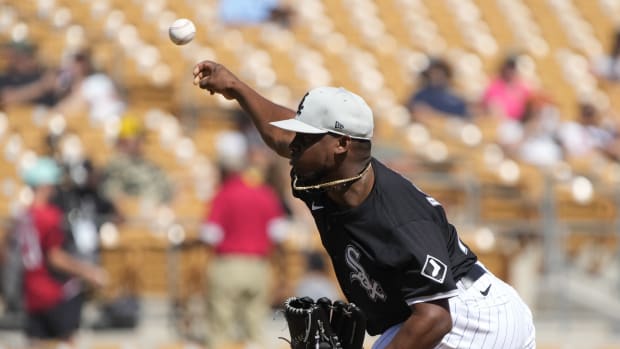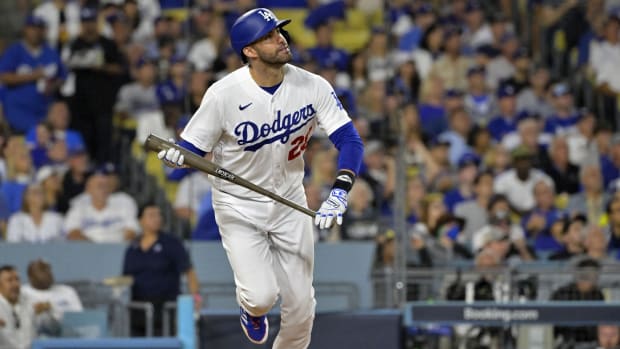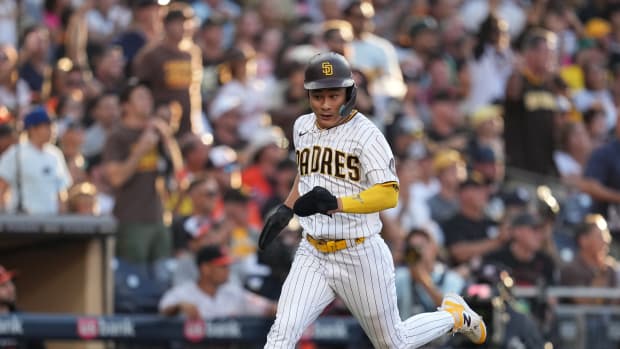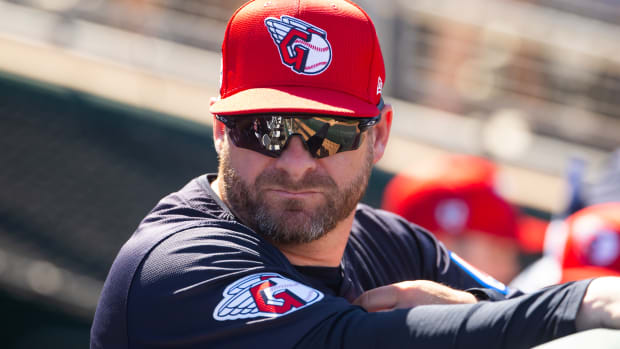Seven NL West Titles Later, Can This Dodgers Team Finally Win It All?
Thanks to a win over the hapless Orioles Tuesday night, the Dodgers became the first team this season to clinch a division. They're the NL West champs for the seventh straight year. That should come as a surprise to you only if you’ve been in a coma since mid-April: Los Angeles led the West nearly wire to wire, taking first place for good two weeks into the season.
Again, this was all expected. FanGraphs gave the Dodgers an 83.6% chance of winning the division before the season began, and those odds never dipped any lower than 84% once the year got underway. A far more difficult thing to predict, though, will be whether the Dodgers can turn this latest division title into the outcome they’ve sought and failed with the previous six: a World Series win.
In a few respects, this is probably the best Los Angeles outfit to vie for a championship since that reign over the NL West began in 2013. Among those seven squads, the 2019 edition ranks first in numerous offensive categories, including runs per game, home runs, on-base percentage, slugging percentage and OPS+. Cody Bellinger is amid an MVP-caliber campaign; Joc Pederson has hit 32 home runs; Justin Turner has a 131 OPS+; rookie catcher Will Smith has a .978 OPS; on and on and on. It’s an offense built with no holes: Just three Dodgers with 100 or more plate appearances put up an OPS+ of 100 or worse. Pitchers will find no respite this postseason in Los Angeles’ lineup—particularly so once Max Muncy returns from a broken hand sometime in late September.
The bigger question, though, lies in the pitching. Rotation-wise, the Dodgers will throw Clayton Kershaw and Walker Buehler to start the Division Series against whichever unlucky squad wins the wild-card game. Beyond that, things get hairy. A month ago, it would’ve been not only a no-brainer but also a huge comfort to have Hyun-jin Ryu starting either Game 2 or 3. But in his last four starts, the roly-poly lefty has been pummeled for 21 runs in 19 innings, spoiling what had been a Cy Young-worthy year to that point. Fatigue may be playing a part: Ryu’s 161 2/3 innings are almost twice as many as he threw last year and his first time cracking the 150-mark since 2014, before injuries robbed him of huge chunks of the next four seasons.
There’s still time for Ryu to right himself (or get some rest) before October, but the Dodgers lack dependable options behind him. Rich Hill will return to the rotation on Thursday following a three-month stint on the injured list due to an elbow strain, but he’s in no condition to pitch more than a few innings at a time. That’s also the case for Los Angeles’ rotating cast of swingmen: Kenta Maeda, Julio Urias and Ross Stripling have all shuttled between the rotation and bullpen as needed, but no one in that trio is a good bet to go deep in playoff games.
That may be a strategy the Dodgers embrace, though—having the quartet of Hill, Maeda, Urias and Stripling piggy-back one other, each going two-to-three innings at a time, or simply aiming for 12–15 outs with each before going to the bullpen. (Another possibility: Turning to rookies Dustin May and Tony Gonsolin, but they seem better bets to work in relief.) Dave Roberts would probably prefer Ryu revert to his pre-August self instead of having to play Russian Roulette with his pitching staff, but he may not have a choice.
The other concern for Roberts and company is the endgame. Dodgers fans are used to Octobers in which they watch the late innings through their fingers, but things are usually more in control once All-Star closer Kenley Jansen comes onto the scene. But the big righty has been decidedly pedestrian this season after a down 2018 as well, thanks to a flat-lining strikeout rate and a walk rate that’s almost tripled since ‘17. Opposing batters are slugging .458 on a cutter that used to be untouchable, and his velocity continues to trend downward. Add it all up, and Jansen has a 5.00 ERA since the All-Star break and blown seven saves this season, third most in baseball.
With Jansen struggling, Roberts may have to lean more heavily on the supporting cast—one that comes with its own issues. Pedro Baez looked like a new man early in the season, with a 2.70 ERA in the first half, only to revert to his untrustworthy self since the break, posting a 4.24 mark. On the flip side, Joe Kelly went from unplayable (an 8.35 ERA in April and May) to lockdown (3.06 with 21 strikeouts in 17 ⅔ innings in the second half). Roberts has also gotten good work in that span from lesser-known names like Casey Sadler, Yimi Garcia, Dylan Floro and Caleb Ferguson. But Sadler lacks swing-and-miss stuff, Garcia is homer-prone, Floro has pitched just four times since the start of August due to injury, and Ferguson has mostly been confined to low-leverage appearances.
All of which is to say that the Dodgers lack a relief ace going into October, unless they truly trust Kelly or feel like Jansen can be his old self in the playoffs. A shaky bullpen, as noted earlier, is nothing new for Los Angeles. But in years previous, Jansen has helped stabilize the foundation, if not kept it from outright collapse. Maybe this is where the Dodgers get creative with May, Gonsolin or Maeda, who was exclusively a reliever in the last two postseasons. But leads and high-leverage situations will be a constant tightrope.
If nothing else, the Dodgers will go into October with one of the best lineups they’ve ever fielded, plus Kershaw and Buehler acting as a powerful 1–2 punch. Will that be enough to end the 31-year championship drought? It’s an enviable position from which to start. Then again, should Los Angeles shoulder through a relatively weak NL field and claim its third straight pennant, awaiting it in the Fall Classic will likely be either an Astros team that has one of the best offenses in league history (plus Justin Verlander and Gerrit Cole), or a Yankees team that’s hit more home runs than any club that’s ever existed. Even for a super-club for which the postseason was practically pre-ordained, nothing comes easy.



































